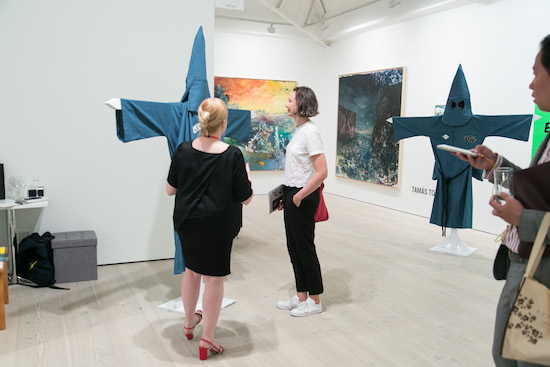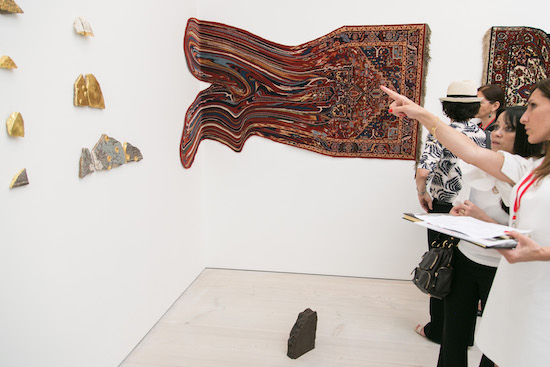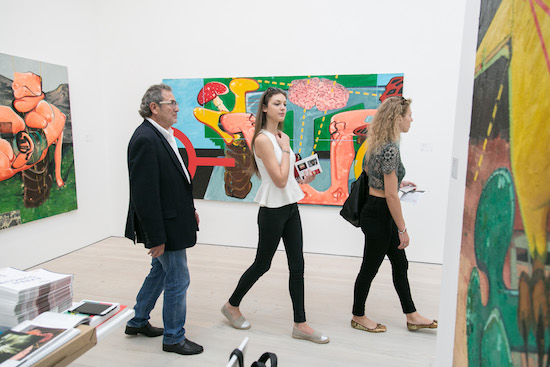“…But we’re having a performance here in a moment –”
“Oh, yes?”
“– on the theme of tension…”
To a shudder of electronics from a small wedge speaker in the corner of the booth, Mai Nguyen-Tri, dressed in a cloud of white chiffon and matching swimming cap, her skin dusted with talc, perches on a silver dustbin lid in the manner of a frog preparing to leap. Tied to the lid’s handle runs a thin red rope, snaked across the floor.
A beat from the corner wedge. Nguyen-Tri strikes a pose, wide-eyed, her mouth a gaping O. She proceeds to dance balletically about the cramped space, coiling the rope about her as she does. It leaves marks on her arms where it’s rubbed off the talc. The tension of taut fibres mingles with the inner tension of the dancer’s pose, and – something else. A different kind of traction, coming from her interactions with the few dozen onlookers. At one point she proffers the upturned lid to each in turn. The gesture is ambiguous. What is she miming here? An offer of invisible food? Or the pan-handler’s plea for spare change?
The dance ends with a limp flourish, deflated upon the lid like an evacuated balloon. The music stops. The dancer springs up. “Thank you to Conrad Armstrong,” she declares, “and fuck Brexit!” A muted cheer.
Armstrong himself takes centre stage now, looking like a post-apocalyptic carnival barker. He wears a tartan jacket and cochineal-coloured hair cascading down to his nipples, past a necklace made of beads, safety pins, house keys, and the ring pull of a can of pop. “This is my work,” Armstrong announces, gesturing to the canvases on the wall behind him – taut ab ex smears and splashes, strung like burst bubblegum from edge to edge with the whole thing tied, BDSM-style, with a similar red cord. He describes them as an “emotional outburst” in response to Brexit and the breakdown of community then proceeds to read a poem of his own composition in deeply sincere tones.
Armstrong is the host and compere of the Sunday Service, a monthly “open platform” in Hackney Wick, for “anyone,” he says, “who wants to express themselves.” But today they are squatting in the booth of a gallery called Unit G, upstairs at the Start Art Fair.

Intended as a launchpad for “emerging artists and new scenes”, Start opened four days earlier at the Saatchi Gallery in West London. “I’m really excited by the range of this year’s START Projects which go from in-depth presentations of one artist’s practice through to a vibrant group show of Taiwanese art and an artist-curated project,” fair director Niru Ratman said at the beginning. “Each project strongly links back to our aim of introducing artists and art scenes that are new to London’s audiences.”
On the first floor I found an exhibition of young Taiwanese artists curated by Mehta Bell Projects, a London-based contemporary art consultancy. Ting Cheng’s surreal photographs, depicting dogs with tennis balls for feet or a girl watering dried flowers, tucked into the back of her hoodies, with a rubber dildo, rub cheek by jowl with sculptures by Ting-Tong Chang, featuring taxidermied birds, electronically animated, which speak the days of the week in a computer-synthed baritone. Across the room, another of Chang’s works finds a small tree trunk augmented with plastic flowers and more mechanically-mobile birds, supported by a loudspeaker from which issue the voices of Noam Chomsky and Michel Foucault, arguing about human nature.
“I think it’s too hasty,” Chomsky insists, “to classify our existing systems of justice as merely systems of class oppression.” I can almost see the eyebrow rising up on Foucault’s polished dome.
“The whole exhibition,” co-founder Jag Mehta tells me on my way out, “is structured around a discussion we had on Thursday about the role of globalisation in an art world dominated by fairs.”
“I think it was very progressive,” she continues, “to allow that discussion to happen in an art fair.”

Elsewhere, thirty-something Taiwanese artist Chang Yung-Ta’s relativity +/- (2015) consists of a disc of black iron on a heating plate with a Sennheiser directional microphone pointing directly at it. A computer controls the temperature of the hot plate such that it is always heating or cooling the iron. Through a pair of headphones we can hear the complex stridulations of the plate as it expands and contract, tinkling and crackling in delicate polyphony.
A gallery assistant informs me that, since this particular material is commonly used in Taiwanese window fittings, this precise sound is very common, everyday noise on a hot Taipei morning. The stand, the mic, the computer, the plate, and the headphones, are then an elaborate apparatus for forcing our attention upon a commonly ignored aspect of daily life, making the invisible visible – or rather, audible. I drift out of the gallery, back into the grey of the city, dreaming of the beautiful filigreed sonics of a Taiwanese kitchen at dawn.
Start Art Fair runs from 15 – 18 September at the Saatchi Gallery, London


